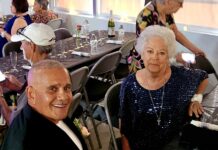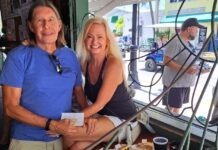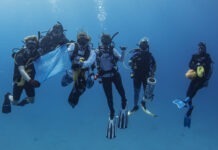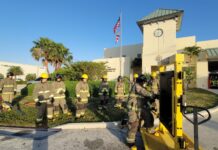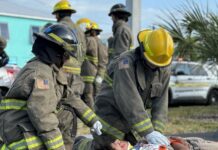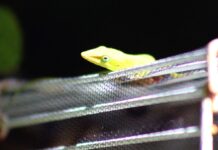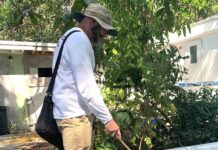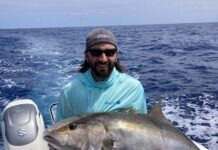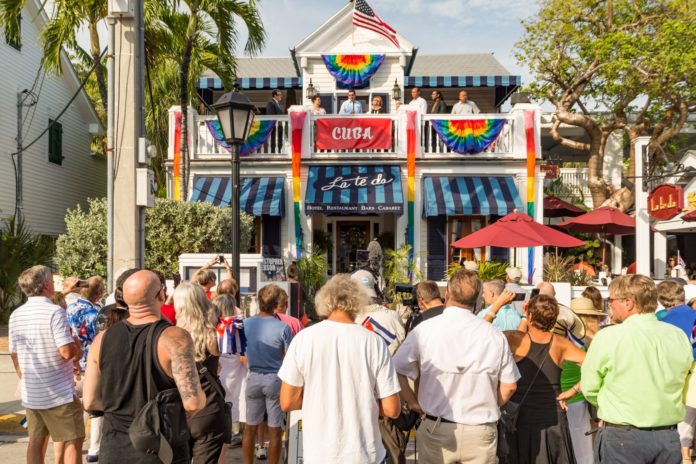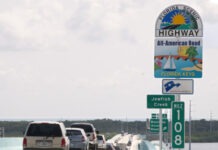Jose Marti came to Key West in May of 1883, having established a relationship with the Cuban leaders of the community who were eager to support Cuba’s bid for independence. The revolutionary addressed the town from the second-floor balcony of the stately home owned by cigar manufacturer Teodoro Perez. Marti spoke passionately about Cuba’s bid for independence from Spain, seeking support for his cause — the political, cultural and intellectual independence of Cuba and the rest of Latin America. While his tour spanned larger U.S. cities, the Cuban community of Key West remained close to Marti’s heart, which he regarded with “tenderness, just pride, and gratefulness.” It was the heyday of the cigar industry, and Cuban influence was writ large in “Cayo Hueso.”
Last week, on May 14, Cuban Ambassador to the U.S. Jose Ramon Cabañas stood on that very balcony — now the popular inn and restaurant La Te Da — addressing a lively crowd, greeted by Key West businesspeople and officials including Mayor Teri Johnston. Cabañas said he was visiting our city in an effort to strengthen the relationship and the cultural exchange between Key West and Cuba. He also said his goal was to invite 500 people from Key West to attend the celebrations in the capital city of Havana this year.
The number 500 is deliberate: the Cuban capital city will celebrate its 500th anniversary this year. In November, Havana will host festivities including open concerts, green initiatives, and rebuilding and repairing projects to properly appoint the city for her birthday. This year marks many firsts for Cuba, including the March visit of British royals Prince Charles and Camilla Duchess of Cornwall to the city — the first members of the royal family ever to visit the island nation.
Besides Havana’s big birthday, why the whirlwind PR push now?
Cuba seems to be on the cusp of international reconsideration, coming out of the shadows of the Castro regime — though still operating under the model of Marxist communism. Massive paintings of Fidel Castro adorn the capital, and the language of nationalist propaganda papers the newsstands. Yet the world stage is taking notice of diplomatic gestures like the ambassador’s visit to Key West.
When Ambassador Cabañas took his position in 2015, after many years in Cuba’s Foreign Service, he became the first Cuban ambassador to the U.S. in the last 50 years. Cabañas took the position during the Obama administration, which took an interest in normalizing relations. In 2015, President Obama — the first U.S. president to visit Cuba since 1928 — met with then Cuban President Raul Castro to negotiate the “thaw” of the Cold War relationship between the two countries. Trade restrictions were lightened, if not lifted, as was travel for U.S. citizens. Obama restored “people to people” travel cards, allowing U.S. citizens to visit for cultural, recreational or educational purposes.
Ambassador Cabañas appeared to be making a bid for — and participating in—this very type of travel while in Key West. Cabañas, his wife Edilia, and Counselor Rodney Gonzales Maestrey were invited and escorted by former City Commissioner Tony Yaniz, as well as founder of the Conch Republic Independence Festival and owner of 801 Bourbon Bar, Jim Gilleran. Yaniz and Gilleran led the ambassador through a tour of the cultural landmarks of Key West.
Gilleran credits Yaniz as the catalyst for the visit but was thrilled to be on board.
“My personal belief is that we can learn a lot more by engaging with Cuba than not. And the historic ties between Key West and Cuba are huge,” he said.
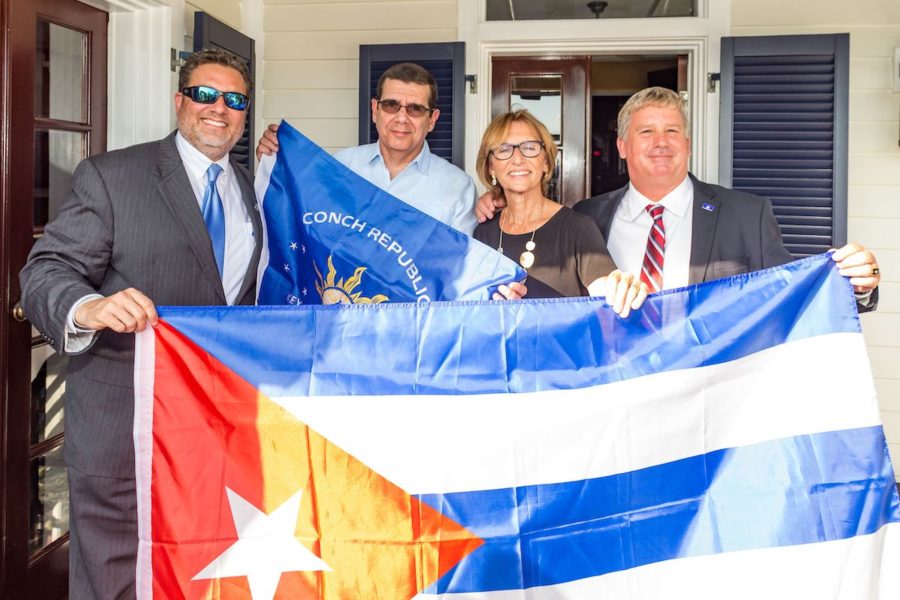
Key West author David Sloan took the visiting group on a trolley tour with Commissioner Clayton Lopez and Michael Morawski, CEO of the Hemingway House. The tour covered topics and sites like Marti’s addresses on Duval Street, the historical and economic significance of the cigar industry, the record-breaking crossings of the Florida Straits by Diana Nyad, Sonny McCoy and Paul Menta — whose Key West Legal Rum Distillery hosted the ambassador for a taste of the favorite Cuban spirit. Good thing, as beloved Cuban Havana Club rum isn’t available for consumption in the States, as it is still trade-restricted by the U.S.
Menta focused on commonality over shared spirits, saying “Rum is an international language and is something we all agree on,” and calling the visit from the ambassador an “honor.”
Sloan took a similar approach. “I broke the ice talking about the Beatles and finished by explaining our One Human Family philosophy,” he said. “They are two things that bring people together every time.” He also pointed out the need to be friendly to our Southern neighbors, as Cuba is, in his words, “closer than Walmart.”
Key Westers overall embraced the visit as an opportunity to share our local treasures and way of life with the visiting dignitaries. Cabañas responded in like manner. He and Maestrey said that they were in Key West not only to celebrate the long-standing ties between the two islands but also to learn from the Keys’ tourism industry. On a private tour of the Hemingway House Cabañas and Morawski discussed how to further develop the relationship between the Key West property and Finca Vigia, Hemingway’s property outside of Havana, Cuba.
At the Hemingway House, Ambassador Cabañas queried as how to cross-promote the two attractions and create an “exhibit exchange.” Cabañas’s team took notes, exchanged contact info with officials and businessmen and women in Key West, and brainstormed ways to better connect the two cities in the interest of shared benefit.
“There are so many reasons for the people here to visit Cuba,” Cabañas said. “We are celebrating the 500-year anniversary of Havana. We have multiple galleries and concerts. Finca Vigia has beautiful memorabilia and artifacts.” While Finca Vigia is not centrally controlled by one tour company — in the way the Hemingway House is — Maestrey and Cabañas discussed how they might streamline tourism to Finca and maximize profit and quality of experience. Representatives of the property have already worked closely with the Hemingway Foundation in Boston.
When queried about whether the “people-to-people” cultural visa (which was previously the most broadly interpreted and used for non-official business) works well, Cabanas said simply: “For us, it does. For some people in your government … not so much.”
Indeed, when President Trump entered office, he announced that he was “cancelling” the loosened stipulations of the new relationship, though the changes have been slow. While tourism to Cuba still exists, Trump reversed Obama’s enactment of people-to-people visas, threatening violators with 10 years in prison and a $250,000 fine. In late April, Trump’s national security advisor John Bolton announced that the Department of the Treasury would implement further regulatory changes to restrict nonfamily travel to Cuba. “These new measures will help steer Americans’ dollars away from the Cuban regime,” Bolton said.
While Cuba has, in the Castros’ wake, elected President Miguel Diaz Canel, the political and cultural environment has, from afar, remained largely unchanged: poverty, prostitution, media censorship and centralized governmental control remain. The philosophies and realities of those in the United States vs. Cuba remain very different. But it seems Cabañas, and the people of Key West, have an eye for closing, or at least shortening, the gap and finding common ground.
Locals like Jim Gilleran already support this mission through his travel agency, Amiga Travel, which arranges tailored visits to Cuba from Key West. Amiga focuses on cultural enrichment and exchange. OKW, or Our Key West, founded by Robin Smith Martin, offers day trips to Cuba, and also offers education through themes like The Hemingway Excursion. At least anecdotally, it seems like more Key Westers have visited Cuba than the rest of the states combined.
“Havana is our sister city,” said Smith-Martin. “People forget that Key West was Spanish before it became part of America, and I hope we can continue and improve the dialogue between our two cities.”
Cruise ships, of course, dock at ports in Key West and Havana as well—it’s the means of travel Hemingway chose when he first arrived in Key West from Havana with wife Pauline, destined to buy the house on Whitehead Street (and destined to return to Cuba). It seems that, on land and sea, through literature like Hemingway’s “Islands in the Stream” and Marti’s revolutionary poetry, our two islands will continue to enjoy a close relationship. Closer, if diplomatic efforts like those of Cabañas have anything to do with it.
While the ambassador didn’t announce when he was returning, he did invite everyone to Havana’s birthday party. It seems like some may be in attendance—or at least cheering from our Southernmost shores.
“There is a tremendous amount of camaraderie and working together that will result from that visit,” said Commissioner Lopez at the May 21 city commission meeting. Commissioner Kaufman added: “The connection our city will have with Havana for economic and cultural exchange is exciting.” Jim Gilleran is even working on erecting a marker in Cuba that says “90 miles to Cayo Hueso.”
Viva la relationship.
Traveling to Cuba by air isn’t that complicated either. Just book a ticket through a major airline and follow their travel instructions by securing a tourist card. Be sure the category selection accurately represents the purposes of the trip—and you can prove it if pressed to upon return.
Categories of Legal Reasons for Cuban Travel
Family visits
Support for the Cuban people
Educational, religious or journalistic activities
Humanitarian projects
Professional research and professional meetings
Activities of private foundations
Research or educational institutes
Public performances, clinics, workshops, athletic and other competitions and exhibitions
Official business of the United States government, foreign governments and certain intergovernmental organizations Exportation, importation or transmission of information or informational materials
Certain authorized export transactions
